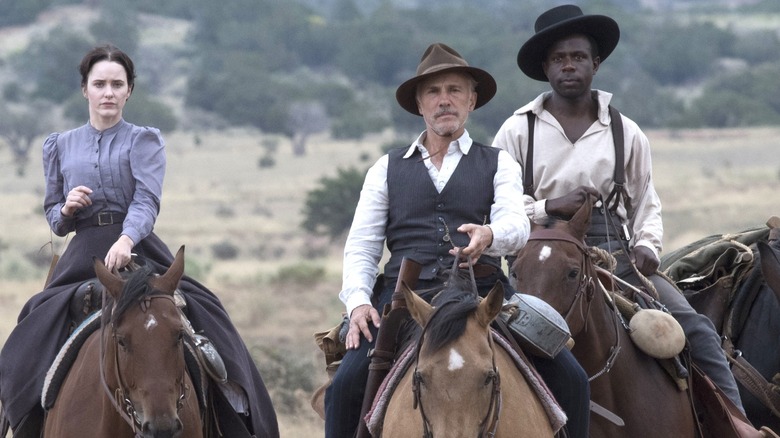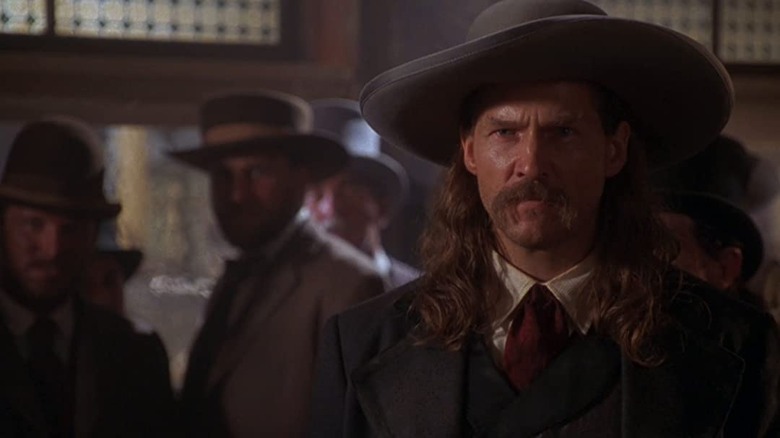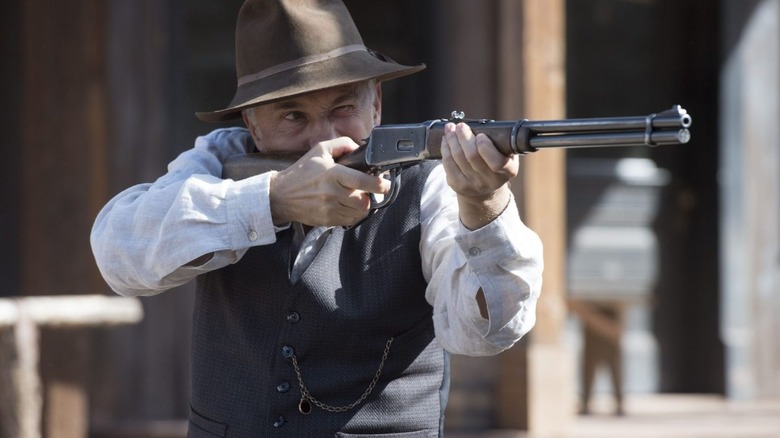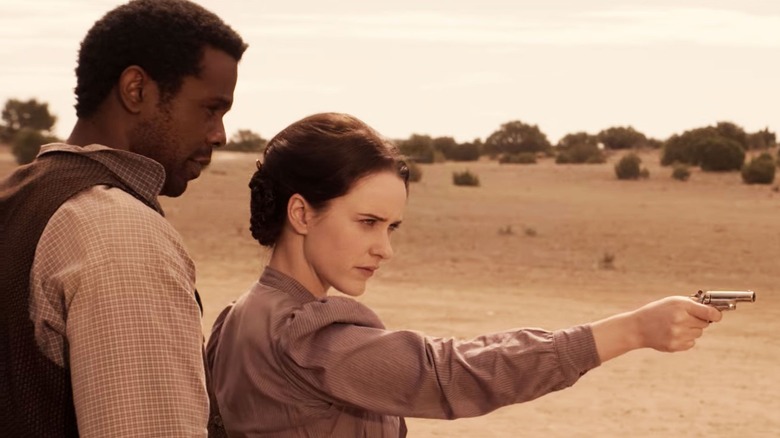Dead For A Dollar Director Walter Hill Shares His Affinity For Westerns [Exclusive Interview]
Walter Hill is back with "Dead for a Dollar." The influential writer and director behind "48 Hrs," "Streets of Fire," Southern Comfort," "The Driver," and "The Warriors" has returned with another western. For Hill, all of his movies, in one way or another, are westerns. He tends to follow cowboys whether in the streets of New York, New Orleans, San Francisco, or in this case, Mexico.
Hill's latest follows a bounty hunter (Christoph Waltz) sticking to his guns, both morally and literally. It's an ensemble film also starring Benjamin Bratt, Rachel Brosnahan, Willem Dafoe, and Warren Burke. Hill doesn't delight in the times he's depicting, only in the genre. "Dead for a Dollar" is now in good company with Hill's previous big-screen westerns, "Geronimo: An American Legend," "The Long Riders," and "Wild Bill." Recently, the filmmaker talked to us about his love of westerns and his exceptional contributions to the genre.
'Jeff's performance was so good'
I'll just start by saying, I did a quadruple feature of "Long Riders," "Geronimo," "Wild Bill," "Dead for a Dollar," and it made for a good day.
Well, I'm flattered and impressed by your stamina. That's a lot of film.
It wasn't a lot of work.
I'm happy to hear that.
You said in an interview "Wild Bill" is your favorite western you've made. Why is that?
Well, I don't know that I quite said it that way, but I thought it was a very difficult piece of storytelling. I guess what I'm a little defensive about is, I thought Jeff's performance was so good, and I thought that it was overlooked and that rather irritated me. But life is filled with disappointments, but I'm certainly not ashamed of the film in any way. But I think that I was very conscious with "The Long Riders," "Wild Bill," and "Geronimo," of doing a trilogy. Although "Wild Bill” was shot right after "Geronimo," but it belongs in the middle, just historically, I thought if I get a chance to do more Westerns, I'm not going to be so bound by history.
Because when you do "The Long Riders," Jesse is going to get shot hanging a picture, and while Bill is going to have to go back to the No. 10 Saloon and get shot in the back of the head, and Geronimo is going to have to get on train and go to Florida, there's no flexibility for that kind of storytelling. You're bound by it, but it's difficult to make it compelling. In "The Long Riders," I was very conscious. I was overjoyed that I got a chance to make a Western first.
At the same time I was nearly petrified when it dawned on me that this was about the 30th version of telling the Jesse James and the James Gang story. I tried to reconceptualize kind of how to do it, and I didn't want just the traditional narrative approach. I wanted to do it as a ballad, I took more of a musical approach to the presentation. I'm just kind of rambling along here, these are the kind of things that filmmakers think about.
So you felt more freedom and flexibility with "Dead for a Dollar"?
Yeah, in "Dead for a Dollar," it's almost contradictory, but I could valorize the traditions of the Western and touch the bases, but I could also bring in contemporary issues. That was my goal, was the contemporary issues being race and the kind of proto-feminist movement. But I had to be very careful with the modern issues, not to pitch the dialogue in the very modern context. I had to keep it within the bounds of what the dialogue would've been in the 1890s. I think that's your duty as a storyteller, is to stay within the boundaries you've chosen.
'Westerns tend to be Old Testament stories'
When you're making a western, what's your relationship with nostalgia?
Well, I felt when I finished shooting, and then got it in shape editorially, I thought this is very reminiscent of the kind of filmmaking Budd Boetticher did in the late '50s, early '60s. He made low budget films on a tight schedule, which we certainly did, we shot it in 25 working days and we had a limited budget. But it had strong ethical concerns about what the codes of life are, and when do we cross the line? And not in the obvious sense of, no, we're not supposed to kill each other and all that kind of thing, but in much more nuanced attitudes than the characters exhibit, hopefully. That's really for you to say, Jack.
They're almost bound to their codes and can't deviate, like Willem Dafoe's character.
Well, I wanted a worthy adversary for antagonist to Max's protagonist, but I wanted him to be complicated in that he's just not a villain. He's got a sense of irony and sense of self. He's very clever, both with words and in many cases, behavior. And at the same time, there's a self-destructive path that he's on.
As a big fan of "Streets of Fire," it's fun seeing you and Willem Dafoe reunite after all these years.
Well, thank you. Yeah, Willem and I hit it off very well on that film. He and I remained friends over the years. We wanted to work together for years, time and circumstance didn't let it work out, but we finally got a chance again and he just gives such a good performance, I think. He doesn't hit a wrong note in it. I was very struck by the level of the acting, both Christoph and Rachel, and as we were just talking about Will, had very high notes, and the rest of the cast came through, I think, notably too.
You've said before, "Being a director is trying to recreate, within yourself, the emotions you had watching a film when you were very young." What emotions do you want to recreate when you make a western?
Very complicated emotions. I think the first Westerns that I saw, that my brother and I saw, we used to go to the films together, usually the very Wild Bill Elliott, Johnny Mack Brown, and that kind of thing. I know when I was, I don't know what, probably 11 years old, 12 years old, I was just not sideways by shame by how good it was. It was in another world beyond the kind of Westerns I usually had been exposed to, although I had seen "Stagecoach." They used to rerelease successful movies back when I was young. So I saw "Stagecoach" and several other [John] Ford Westerns when I was young.
I saw "The Searchers” when it came out. My grandmother, bless her heart, I think I was about 13, and she took my brother and I and my cousins.. We were down in Long Beach, and we all got on the red car and went up to Los Angeles, and we had a lunch at the famous old cafeteria, I can't think of the name of it now, and then we went and saw "The Searchers" and went back, got on the red car, and went home.
I was exposed to both terrific Westerns and pedestrian Westerns from a very early age. The truth is, all this talking about whether I'm identified, I think, by my new movies as Western, but people identify me as neo-noir about as much as they do Westerns, which is kind of fair. But truth is, I liked almost every kind of movie when I was a kid. The only kind of movies I really didn't like were kid movies, but I very much liked musicals and comedies, of course. Who doesn't?
But the other thing I guess I wanted to say was, so often in terms of storytelling, the B Westerns would start, well some of them, with a mysterious stranger coming to town, obviously on a mission that we didn't know or understand ,but that had great personal import to him and then action would follow. The thing that struck me about all that was the more that you got to know the character and why he was there and what he was up to and all that, the less interesting he got. The character was at his most interesting when he was most mysterious, in purpose. Again, I love to use the phrase that applies to Westerns, the elegant simplicity of presentation that can mask all kinds of complicated, moral, ethical attitudes within the text.
Maybe you've heard me say this before, the people say, "Well, must be fun out there in the Westerns, the horses and the big hats and Wranglers and crew, and of course, the cast." It is fun, but in the storytelling, it's not so much even the history of the west. You're kind of walking around in the Old Testament. Westerns tend to be Old Testament stories. And that is to say there are moral tales that don't usually have modern psychological overtones. But the other truth is, anything you say about films, there's contradictory. Anthony Mann's movies are filled with psychological nuance. But as I say, there's always what everyone says about Hollywood, there's something else that's a contradiction that's true.
'I saw 'Red River'' for the 500th time and it still moves me'
I like how you put it, the elegant simplicity of presentation. Budd could make a 70-minute, simple story that would have more meat to it than most two-hour movies.
Well, I think that is a very primary virtue and one that is, if I dare say so, not often practiced anymore.
Movies start too soon and end too late now.
[Laughs] That's very good.
[Laughs] I'm glad you enjoyed that. There have been a few great westerns in recent years, such as "The Proposition" and "The Assassination of Jesse James by the Coward Robert Ford." Are there any modern westerns you've enjoyed?
I didn't see those. I tend not to look at a lot of contemporary movies, to tell you the truth. I usually am much more interested in directors than what's ahead or what got a good review or something like that. But I see a lot of old films.
What are some old films you've recently enjoyed revisiting?
Well, I think I saw "Red River” for the 500th time and it still moves me. [John] Wayne's performance is so good, as are the others, but it's not a perfect film. And the ending can be thought of in very... Certainly controversial. It can be thought of as [Howard] Hawks betrayed his own movie. It's a very difficult question, really. It is profoundly mysterious about "Red River."
Hawks always said why he wasn't going to make a movie where John Wayne was going to die, but that just covered a lot of attitudes, I think. We all kind of just tried to shorthand some of these answers, the things that we spend weeks and months pondering. The André De Toth' films, he did a number of very good Westerns.
Like you said, you've seen "Red River" 500 times but it's not a perfect movie. Are there any movies you do consider perfect?
What's a perfect movie? I can't think of a perfect movie, now that you put me on the griddle here. But I think some have certainly a greater aesthetic symmetry than others. I think "Seven Samurai" is, in terms of the movie that has great ambition and at the same time really delivers the goods. I mean, it's a deep movie, it's an exciting movie. Quite often movies that are deep turn out to be boring. Samurai is both intrinsically interesting, terribly wise, and just deeply philosophical.
"Dead for a Dollar" is now playing in theaters.



